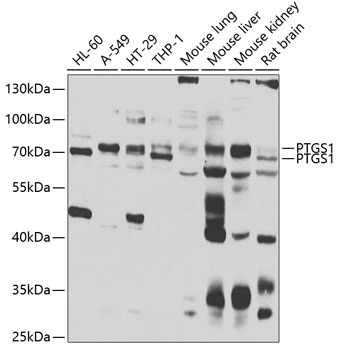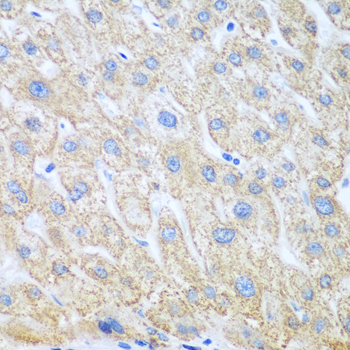-
Product Name
PTGS1 Polyclonal Antibody
- Documents
-
Description
Polyclonal antibody to PTGS1
-
Tested applications
WB, IHC, IF
-
Species reactivity
Human, Mouse, Rat
-
Alternative names
PTGS1 antibody; COX1 antibody; COX3 antibody; PCOX1 antibody; PES-1 antibody; PGG/HS antibody; PGHS-1 antibody; PGHS1 antibody; PHS1 antibody; PTGHS antibody; prostaglandin G/H synthase 1 antibody
-
Isotype
Rabbit IgG
-
Preparation
Antigen: Recombinant fusion protein containing a sequence corresponding to amino acids 1-180 of human PTGS1 (NP_001258094.1).
-
Clonality
Polyclonal
-
Formulation
PBS with 0.02% sodium azide, 50% glycerol, pH7.3.
-
Storage instructions
Store at -20℃. Avoid freeze / thaw cycles.
-
Applications
WB 1:500 - 1:2000
IHC 1:100 - 1:200
IF 1:50 - 1:200 -
Validations

Western blot - PTGS1 Polyclonal Antibody
Western blot analysis of extracts of various cell lines, using PTGS1 antibody at 1:1000 dilution._Secondary antibody: HRP Goat Anti-Rabbit IgG (H+L) at 1:10000 dilution._Lysates/proteins: 25ug per lane._Blocking buffer: 3% nonfat dry milk in TBST._Detection: ECL Enhanced Kit ._Exposure time: 15s.

Immunohistochemistry - PTGS1 Polyclonal Antibody
Immunohistochemistry of paraffin-embedded human liver cancer using PTGS1 antibody at dilution of 1:100 (40x lens).
-
Background
Converts arachidonate to prostaglandin H2 (PGH2), a committed step in prostanoid synthesis. Involved in the constitutive production of prostanoids in particular in the stomach and platelets. In gastric epithelial cells, it is a key step in the generation of prostaglandins, such as prostaglandin E2 (PGE2), which plays an important role in cytoprotection. In platelets, it is involved in the generation of thromboxane A2 (TXA2), which promotes platelet activation and aggregation, vasoconstriction and proliferation of vascular smooth muscle cells.
Related Products / Services
Please note: All products are "FOR RESEARCH USE ONLY AND ARE NOT INTENDED FOR DIAGNOSTIC OR THERAPEUTIC USE"
